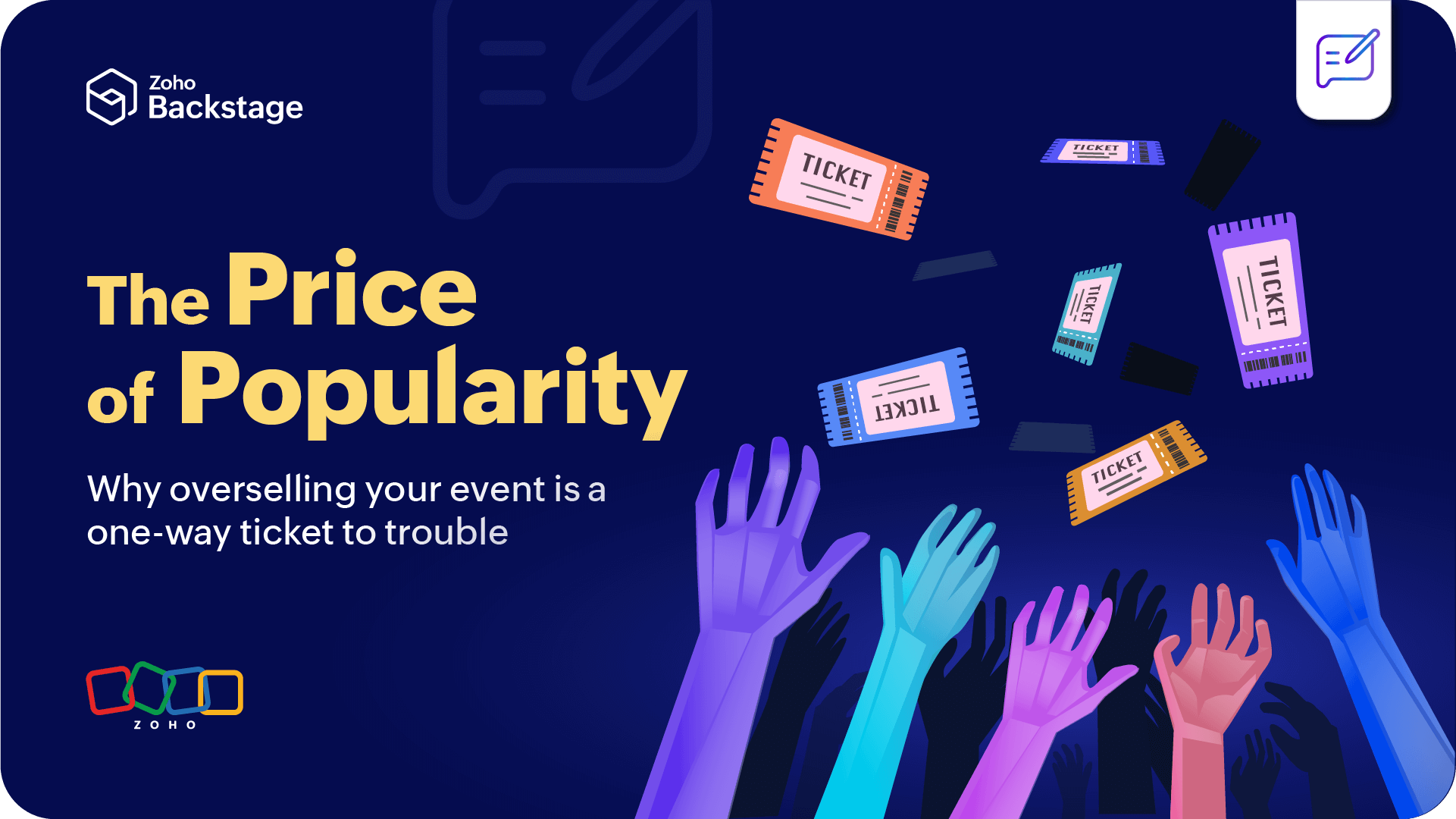How to make your events more diverse and inclusive
- Last Updated : August 18, 2023
- 10.3K Views
- 8 Min Read

After almost a decade of non-stop discussions, we’ve all come to a point of complete agreement—there’s a need to be more diverse and inclusive, be it in the world or the event industry. Today, every event planner is expected to have an inclusivity plan for their events. Sadly, these plans are often just a checklist of tasks that are more about representation than true inclusion. How many events have you been a part of or known where a woman was brought on to balance out the four men on the panel? Or a person of color or minority is hired just for appearances? This sort of window-dressing, though successful in the short-term, defeats the purpose of inclusion and will not work in the long run.
The truth is inclusion has to be more than mere representation alone to leave a truly positive impact on your attendees and the world. Diversity has to be welcomed and appreciated for your events to reach their full potential. Also, this shouldn’t stop with just including more women or more people with diverse racial ethnicities—it should also include people of various ages, physical abilities, economic classes, and educational levels. Your event should mirror the diversity of your society.
Diversity is also advantageous for your event—it expands your attendee base and gives you a wide variety of opinions that will make your event more interesting. In this post, we talk about seven ways you can make your events more diverse and inclusive.
Feature diverse speakers
There’s a reason we stress diversity in an event’s speaker roster—it’s the most visible way to prove your event’s commitment to diversity and inclusivity. How many times have you found an event interesting only to find a speaker lineup that lacked diversity? Ruchika Tulshyan, the author of The Diversity Advantage, puts this really well:
“I find it a waste of time to attend a conference where I won’t learn from a wide variety of expertise, views, and experiences.”
You wouldn’t have this problem if your event had a variety in its speaker lineup. There are a lot of lists on the internet that mention amazing speakers from minority and multicultural backgrounds who can do a lot for your event. Here’s one of 1000 women in tech who are not just incredible at what they do but can also offer your attendees unique viewpoints and perspectives. With so many credible, talented people around, you really have no excuse to go back to the “manels”—male-only panels—of old times. Now that you’ve got your diverse and inclusive speaker lineup, we’ve got some tips on how you can make the event a comfortable space for them.
Don’t ask your minority speaker to talk about diversity. If they do, it’s good. If they don’t, it’s probably because they have something more interesting and important to share.
Don’t tokenize, either. One talk about diversity with two or three diverse speakers just won’t cut it. It’s lip service and hypocritical, and people will realize, sooner or later.
Don’t have any manels in your event. Also, did you know there’s a Tumblr account posting about the various all-male panels at events? You don’t want to be mentioned there, especially with how viral social media posts can get.
Don’t forget diversity amongst your announcers and emcees. They are also part of your event.
This is your first step in making your attendees feel welcome—you’re representing them, and they’ll feel comfortable seeing people like them on stage. You also get to give them content that’s highly relatable and interesting.
Build a diverse team
There’s no better way to embody the spirit of inclusivity than with a diverse team. The more diverse and multicultural your team, the more welcoming it becomes to your attendees. In addition, a diverse team brings a lot of creativity and unique perspectives to the table. They can also connect better with your clients, sponsors, speakers, and attendees. Diversity in your internal team (and event volunteers) is your most honest way of showing the world that your inclusivity isn’t just performative—it informs the very essence of your organization. You can also appoint someone as a sort of event inclusivity champion just to keep reminding the team of your inclusivity goals and guidelines.
And if you’d like to go the extra mile, you can take a look at your entire supply chain and ensure that everything is inclusive. Include diverse suppliers, work with people in the community, and, finally, make it a point to work with vendors, venues, and sponsors who champion diversity just the way you do.
Subscribe to The Green Room
Sign up here and get all the most relevant MICE industry content delivered right to your inbox once a month.
By submitting this form, you agree to the processing of personal data according to our Privacy policy.
Offer inclusive food choices
Despite what we’d like to believe, we’re all picky eaters. Most people have also tied their food choices to other belief systems—religion, environment, health, lifestyle, and more. Then there are people who are allergic to certain kinds of food—the most common of these are nuts, lactose, and gluten. When you host an event that includes meals, you’ve got to give your attendees the option to eat the food they prefer.
Go beyond the standard options like vegan, vegetarian, and meat. Include nut-free, gluten-free, and dairy-free food. Make your meat halal and have kosher food on your menu. When choosing your cuisine, go for one the majority of your audience likes. You can even include questions about food in your event registration form to get an idea of what cuisines your audience prefers.
Remember to check your calendar for religious dietary restrictions that might fall on your event day. For example, Jews don’t eat bread on Passover and Muslims eat only after sunset during the month of Ramadan. Pay attention to small details like this—they’re what will make your event truly stand out.
Focus on accessibility
A lot of people confuse accessibility with inclusivity. And while they aren’t the same—accessibility is just one aspect of inclusivity—we can’t deny that a lack of accessibility can make an event non-inclusive. The Americans with Disabilities Act (ADA) has a set of guidelines that event organizers can use as a starting point. The gist of it is that your event must give your disabled attendees an experience that’s as welcoming and enjoyable as it is for other attendees. Some simple ways you can do this are:
Hosting your event in a wheelchair-accessible venue
Hiring a sign language interpreter
Having restrooms with hand bars
Designing an accessible event website
Choosing words with dignity when addressing disabled people
Allowing service animals on the event premises
Prepare your team and give them the necessary “soft skills” training so they can interact with disabled people without making the conversations awkward. By ensuring that everyone is welcome, you make your event a safe place for all.
Offer a variety of event activities
It’s important to balance the needs of everyone. While not all people will be comfortable with all activities, having a good mix of different activities can ensure that everyone at the event has at least one or two they like. When deciding on the entertainment at your event, take into account all tastes, styles, and personalities. Sometimes, we tend to be shortsighted here—we choose all the activities we like, forgetting that we aren’t the audience and they might be different from us.
That’s why it’s important to get input from various individuals—this way you can add more variety to your activities. You can also conduct a post-event survey to find out what activities your attendees preferred and why.
Include economically accessible options
Accessibility is not always physical, it can also be economic. Some people might want to attend your event, but it might be beyond their means. At the same time, they might be the people who’d benefit most from your event. That’s why you’ve got to make your event accessible for people at all economic levels. Here are some ways to do it.
Event scholarships: Tech conferences are known for their event scholarships. Apple provides up to 350 students a ticket (and free lodging) to their annual WWDC. A lot of other organizations are doing it too. You could also offer tickets at a reduced price so more people can benefit from your event.
Multiple ticket options: Offer many ticket classes at different prices so people can choose a ticket they can afford.
Hybridized events: Virtual events are popular for a very good reason—they’re affordable for attendees who won’t have to pay for travel and lodging. Give your attendees the option to choose to pay only for the virtual component of your event by hosting a hybrid event. This will help them cut down on a lot of costs.
Consider introvert-friendly networking options
When we talk about inclusivity, we often tend to overlook personality types. We forget that some people find crowds and conversation difficult. Most introverts, for example, tend to avoid events (or at least networking at them) because they’re uncomfortable at it and find the process draining. However, you can make this so much easier for them by including introvert-friendly activities at your event.
As most introverts find crowds stressful, offer small places throughout your venue where they can unwind and relax before getting back into the bustle. You can also start some pre-event networking over your event app or social media groups so introverts can break the ice virtually and get to know some people before actually attending the event.
Introverts appreciate a good event as much as their extroverted counterparts. All they need is an event that keeps their comfort level in mind.
Your event is either inclusive or it’s not, and you’re either all in or all out—there’s no halfway point here. Like Catrice M. Jackson says, “If you don’t have a plan for inclusivity, your plan is to be exclusive.” We hope these tips will help you with designing your event’s inclusivity strategy. Also, if you have questions or feel like this is too much of a task for you, you can always reach out to others. There are a lot of people fighting for inclusivity who’d be happy to help.
If, like us, you're more of a social person, let's connect on Twitter (@ZohoBackstage) and we'll keep you up-to-date with all the latest event news.
 Nisha
NishaMarketing and content at Zoho Backstage. Cultural misfit. Armchair traveler. Productivity geek. Sometimes, I write poetry. Sometimes, it rhymes.









Comments(1)
Excellent. Thank you, Backstage and Nisha for discussing an important topic. Really appreciated.